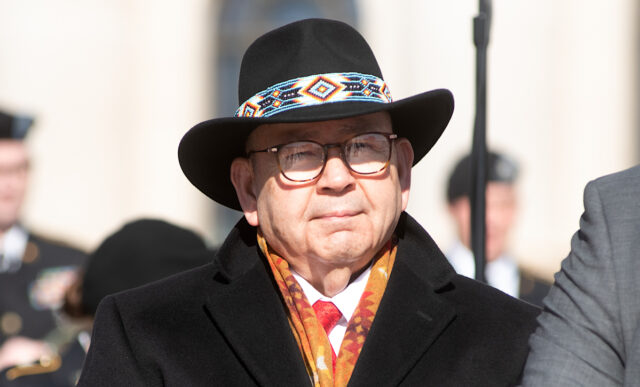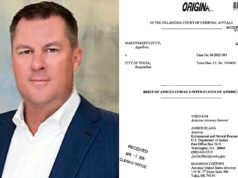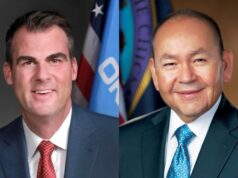
Chickasaw Nation Gov. Bill Anoatubby and his son, Lt. Gov. Chris Anoatubby, were reelected by default for additional four-year terms after candidate filings for the tribe’s July 25 general election concluded late Wednesday. First elected governor of the Chickasaw Nation in 1987, Bill Anoatubby is set to be sworn into his 10th consecutive gubernatorial term in October.
In other Chickasaw Nation election cycle news, one Supreme Court position and four Tribal Legislature seats were also scheduled for election this year. However, only the race for Seat 3 in the Tishomingo District of the Chickasaw Nation Tribal Legislature drew more than one candidate. If no challenges are brought contesting their candidacies by the end of this week, incumbent Steven Woods will face off against a pair of challengers: former Chickasaw Lighthorse police officer Dusk Monetathchi and Shane Langford, a personal trainer.
Having drawn no opponents, Supreme Court Chief Justice Cheri Bellefuille-Gordon, Pickens District Seat 2 legislator Connie Barker and Pontotoc District legislators J. Lisa Impson (Seat 3) and Karen Goodnight (Seat 4) will also retain their positions.
New term puts Anoatubby on pace for 40 years as governor
Prior to being elected governor in 1987, Bill Anoatubby, 77, served two terms as the Chickasaw Nation’s first lieutenant governor under former Chickasaw Gov. Overton James. His son, Lt. Gov. Chris Anoatubby, was first elected in 2019. Chris Anoatubby, 50, won his second consecutive term as lieutenant governor Wednesday.
Unlike some other tribes, the Chickasaw Nation does not employ term limits. Elected officials may serve an unlimited number of consecutive terms, and Bill Anoatubby’s 2023 reelection campaign had already featured fundraisers and yard signs ahead of Wednesday’s filing deadline.
The Chickasaw Nation’s election code requires candidates for governor and lieutenant governor to possess no less than 1/4 Chickasaw blood quantum. The legislative and judicial departments of the tribe have no blood quantum restrictions for candidates.
Currently, about 75,000 people are enrolled citizens of the Chickasaw Nation. Any Chickasaw citizen is eligible to run for legislative or judicial office provided they have not been convicted of a felony and have been a Chickasaw Nation resident for at least one year. Citizens must be at least 25 years old to run for legislative office and at least 30 years old to run for judicial office.
Headquartered in Ada, the Chickasaw Nation jurisdiction spans 7,648 square miles across 13 counties in southern Oklahoma. The Chickasaw reservation was functionally affirmed by the U.S. Supreme Court in its McGirt v. Oklahoma decision in July 2020.
During Anoatubby’s 36 years as governor, the Chickasaw Nation has experienced significant economic growth, including the development of a world-class casino gaming enterprise and other prominent businesses. Anoatubby ran for a U.S. Congress seat in 1998, finishing third in the Oklahoma Democratic Party primary behind Darryl and Walt Roberts.
Chickasaw elections are conducted only through absentee ballots that are mailed in by voters. According to the Chickasaw Nation’s press release Thursday, ballots will be mailed to registered Chickasaw voters on July 6. Ballots must be returned to the Chickasaw Nation Election Commission no later than 10:30 a.m. on Tuesday, July 25. No hand-delivered ballots are accepted.





















